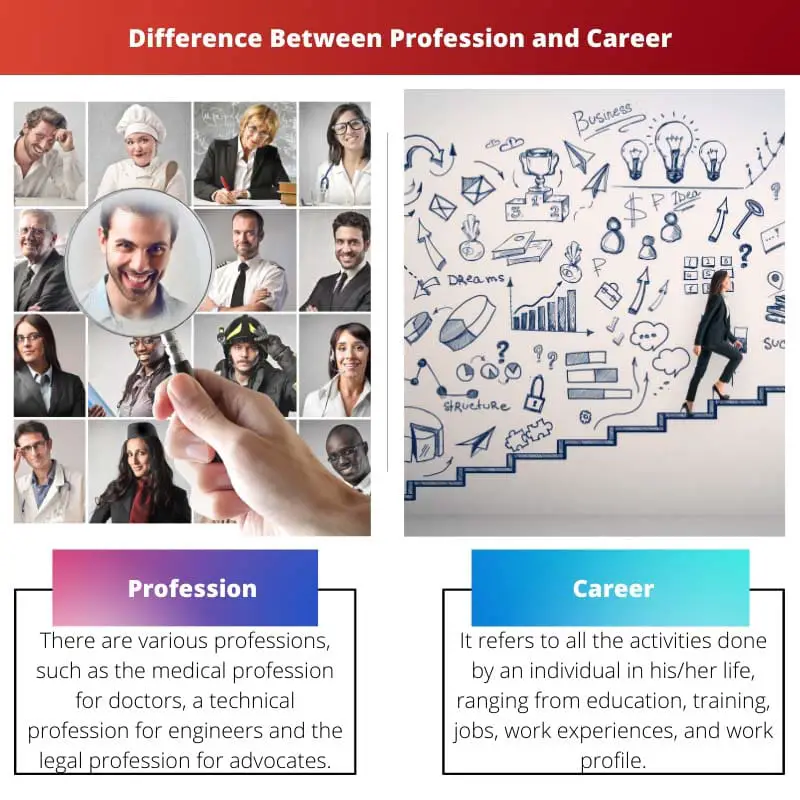A profession is a specific field of work or occupation requiring specialized education and training. At the same time, a career encompasses an individual’s overall work experiences and advancement over their lifetime, which may involve multiple professions or jobs.
Key Takeaways
- A profession is a specialized occupation requiring advanced education and training, while a career is an individual’s work journey over their lifetime.
- Professions have established regulatory bodies, codes of ethics, and licensing requirements, whereas careers are broader and encompass various jobs and roles.
- A person’s career may include multiple professions or a single profession with various positions or organizations.
Profession vs Career
A profession is a type of occupation that requires specialized knowledge, skills, and training and is regulated by a professional body or association. A career refers to the course of employment and professional development that an individual follows over their lifetime.

A profession is to be oriented toward service, but a career is to be oriented toward growth.
Comparison Table
| Aspect | Profession | Career |
|---|---|---|
| Definition | A specific occupation or vocation that requires specialized knowledge, skills, and formal education or training. | A person’s work history, including all jobs and positions held, as well as their long-term professional development. |
| Specialization | Typically involves a high degree of specialization and expertise in a specific field or discipline. | Can encompass various occupations, roles, and positions within one’s overall work history. |
| Education and Training | Often requires formal education, training, and certification in a specific area of expertise. | May involve a variety of educational and training experiences, not necessarily in a single profession. |
| Ethical Standards | Professions have established codes of ethics and professional conduct that members must adhere to. | Ethical considerations can apply to one’s entire career, but they may vary depending on the specific jobs and industries involved. |
| Examples | Medicine, law, engineering, accounting, nursing, teaching, architecture. | Sales, management, entrepreneurship, marketing, information technology, healthcare, education. |
| Long-Term Perspective | Typically viewed as a lifelong commitment to a specific field, with a focus on continuous improvement and development. | Encompasses a person’s entire working life, including various jobs, transitions, and career changes. |
| Career Path | A profession may be a subset of a person’s overall career path, representing a significant part of their working life. | A career path includes all the jobs and roles a person has held, both within and outside a specific profession. |
| Advancement Opportunities | Within a profession, there are established pathways for career advancement, such as promotions or specialization. | Career advancement can involve transitioning to new roles, industries, or even starting one’s own business. |
| Flexibility | Professions may offer less flexibility to switch to entirely different fields due to specialized knowledge and skills. | A career provides more flexibility to explore various job opportunities, including switching between professions. |
What is a Profession?
A profession is a specialized occupation or vocation that requires high expertise, specialized knowledge, skills, and formal education or training. Professions are characterized by a commitment to ethical standards, codes of conduct, and the well-being of the public or clients they serve. Professionals in a specific field belong to professional associations or organizations that help regulate and uphold professional standards.
Key Characteristics
- Specialized Knowledge: Professionals possess specialized knowledge and skills not held by individuals outside the field. This expertise is developed through education, training, and practical experience.
- Education and Training: Many professions require formal education and training, involving advanced degrees, certifications, or licenses. This training ensures that professionals have the qualifications to practice in their field.
- Ethical Standards: Professions have established codes of ethics and professional conduct that members must adhere to. These ethical guidelines help ensure the integrity and trustworthiness of the profession.
- Client or Public Focus: Professions are service-oriented and exist to serve the needs and interests of clients, patients, or the public. Professionals are expected to act in the best interests of those they serve.
- Regulation: Government bodies or licensing authorities regulate some professions to ensure practitioners meet specific standards and qualifications. This regulation helps protect the public from unqualified or unethical practitioners.
- Ongoing Development: Professionals are committed to continuous learning and development within their field to stay current with the latest research, best practices, and advancements.
Examples of Professions
- Medicine: Doctors, surgeons, nurses, and other healthcare professionals diagnose, treat, and care for patients’ health.
- Law: Lawyers, judges, and legal professionals who provide legal advice, represent clients, and uphold the law.
- Engineering: Civil engineers, electrical engineers, and other engineering professionals who design, build, and maintain infrastructure and systems.
- Accounting: Certified public accountants (CPAs) and other accounting professionals provide financial and tax-related services to individuals and businesses.
- Teaching: Educators and teachers who provide instruction and guidance to students in various subjects and levels of education.
- Architecture: Architects who design and plan buildings and structures.
- Psychology: Psychologists and psychiatrists who diagnose and treat mental health conditions.

What is a Career?
A career is an individual’s journey through learning, work, and other aspects of life. It encompasses the pursuit of long-term goals, professional development, and personal fulfillment.
Components of a Career
- Education and Skill Development: A crucial foundation for a successful career is continuous learning and skill enhancement. Education provides the knowledge base, while acquiring new skills ensures adaptability in evolving industries.
- Professional Experience: Gaining practical experience through internships, part-time jobs, and full-time employment contributes to the growth and refinement of one’s career. It allows individuals to apply theoretical knowledge in real-world scenarios.
- Career Goals and Planning: Setting clear career goals and creating a strategic plan are essential components. This involves identifying aspirations, assessing strengths and weaknesses, and aligning personal values with professional objectives.
Career Paths and Specializations
- Diverse Fields: Careers span various industries and sectors, ranging from technology and healthcare to arts and business. Each field offers unique opportunities and challenges, allowing individuals to tailor their career paths to their interests and strengths.
- Specializations: Within each field, there are specialized areas of expertise. Professionals may choose to specialize in a specific niche, gaining in-depth knowledge and becoming experts in a particular aspect of their chosen field.
Importance of a Fulfilling Career
- Personal Satisfaction: A fulfilling career aligns with personal passions and interests, providing a sense of purpose and satisfaction. This intrinsic motivation contributes to overall well-being.
- Financial Stability: A successful career leads to financial stability, enabling individuals to meet their basic needs, pursue leisure activities, and plan for the future.
- Contribution to Society: Many careers involve contributing to the betterment of society. Whether through healthcare, education, or other fields, professionals play vital roles in shaping and improving the world around them.

Main Differences Between Profession and Career
- Definition:
- Profession: A profession is a specialized occupation or vocation that requires specialized knowledge, skills, and formal education or training. It involves a commitment to ethical standards and codes of conduct.
- Career: A career refers to a person’s entire work history, including all jobs, roles, and employment-related experiences, as well as their long-term professional development.
- Scope:
- Profession: It represents a specific field or discipline that individuals choose to specialize in, involving a high degree of expertise and focus.
- Career: It encompasses a broader and more comprehensive view of a person’s work life, including various jobs, roles, transitions, and experiences across different fields or professions.
- Focus:
- Profession: Focuses on a person’s expertise, knowledge, and skills within a particular specialized area. Ethical standards and adherence to professional codes are central.
- Career: Focuses on a person’s entire working life, including their job history, career progression, and personal and professional growth.
- Education and Training:
- Profession: Typically requires formal education, specialized training, and certifications or licenses. Professionals develop expertise in a specific field.
- Career: Encompasses all levels of education, training, and experiences a person gains throughout their working life, not limited to a single profession.
- Ethical Standards:
- Profession: Professions have established codes of ethics and professional conduct that members must follow to maintain integrity and trustworthiness.
- Career: Ethical considerations can apply to a person’s career, but the specific ethical standards may vary depending on the jobs and industries involved.
- Examples:
- Profession: Examples include medicine, law, engineering, accounting, teaching, and architecture.
- Career: A career may involve working in various professions or industries, such as sales, management, entrepreneurship, marketing, or healthcare.
- Long-Term Perspective:
- Profession: Typically viewed as a lifelong commitment to a specific field or area of expertise, focusing on continuous improvement and development.
- Career: Encompasses a person’s working life, including different phases, job changes, and career transitions.
- Advancement Opportunities:
- Profession: Within a profession, there are established pathways for career advancement, such as promotions or specialization within that specific field.
- Career: Career advancement can involve transitioning to new roles and industries or starting a business. It offers a broader range of possibilities.







